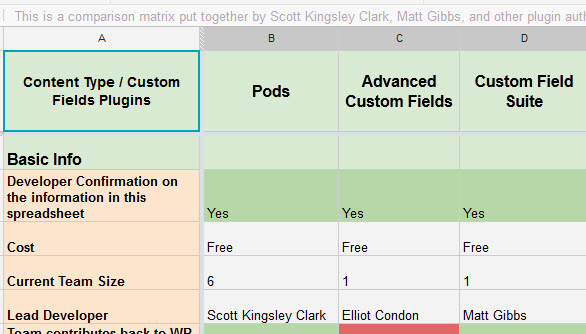If you’re looking to use a Content Type or Custom Field plugin, your first stop should be this large comparison spreadsheet produced by Scott Kingsley Clark, Matt Gibbs and other plugin authors. The comparison spreadsheet shows the differences between the various plugins at a high level. Unfortunately, I can’t determine when this document was last updated or find an explanation of the various fields represented. For example, one of the fields talks about whether the team contributed back to the WordPress core. It would be interesting to know the qualifications for contributing back to core.
With so many plugins in existence that aim to serve the same purpose, more informative spreadsheets like these would definitely be beneficial for the community.

Magic Fields ?